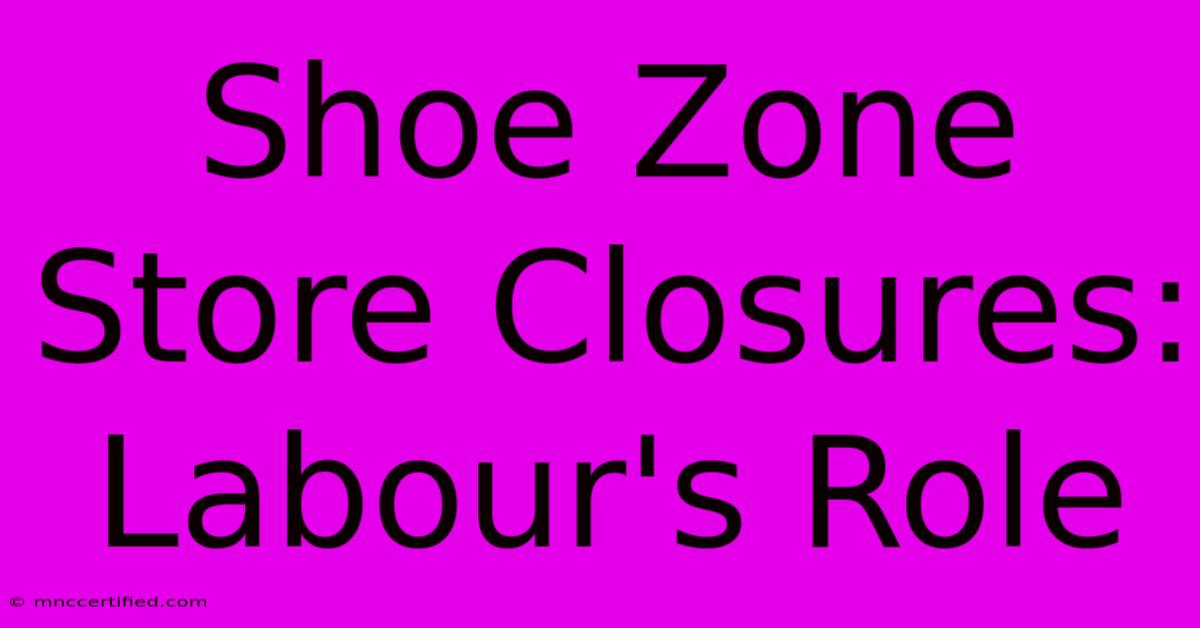Shoe Zone Store Closures: Labour's Role

Table of Contents
Shoe Zone Store Closures: Labour's Role – A Critical Analysis
The recent spate of Shoe Zone store closures has sparked debate, with some pointing fingers at the Labour party's policies. This article will delve into the complexities of the situation, examining the potential links between Labour's economic policies and the challenges faced by Shoe Zone, while acknowledging other contributing factors. We'll avoid simplistic narratives and instead offer a nuanced perspective, looking at both sides of the argument.
The Impact of Rising Costs on Shoe Zone
One of the most significant challenges facing Shoe Zone and many other retailers is the rising cost of living. Inflation, impacting energy prices, supply chain disruptions, and increased wages, has squeezed profit margins significantly. These increased operational costs directly impact a budget-conscious retailer like Shoe Zone, which relies on offering affordable footwear. While Labour's economic policies might indirectly influence inflation, it's crucial to remember that global factors also play a major role. Attributing the closures solely to Labour's actions would be an oversimplification.
Labour's Minimum Wage Policy: A Double-Edged Sword
Labour's commitment to a higher national living wage is often cited as a contributing factor to Shoe Zone's struggles. While increased wages are beneficial for employees, they also represent a significant expense for businesses. For a company like Shoe Zone, operating on tight margins, this added cost could pressure profitability. However, it's important to consider that a living wage is crucial for economic justice and boosts consumer spending power, potentially offsetting the increased costs for businesses in the long run. This is a complex issue with no easy answers.
The Impact of Taxation and Business Regulations
Another potential area of concern is the impact of taxation and business regulations. While Labour advocates for fair taxation to fund public services, some argue that higher taxes could negatively impact businesses' ability to invest and expand. Similarly, stringent regulations can add administrative burdens and costs, affecting smaller retailers more acutely. However, it's essential to note that responsible regulations are crucial for protecting workers' rights and ensuring fair business practices. This is a balancing act that requires careful consideration.
Other Contributing Factors Beyond Labour's Policies
It's crucial to acknowledge that many factors beyond Labour's policies contribute to Shoe Zone's challenges:
- Online Competition: The rise of e-commerce has significantly impacted brick-and-mortar retailers, including Shoe Zone. Online retailers often offer lower prices and greater convenience.
- Changing Consumer Habits: Shifting consumer preferences and buying patterns also play a role. Consumers are increasingly conscious of sustainability and ethical sourcing, which can impact demand for cheaper footwear.
- Supply Chain Disruptions: Global supply chain issues, exacerbated by geopolitical events, have added to the pressure on retailers, increasing costs and impacting stock availability.
A Balanced Perspective: Beyond Blame
Attributing Shoe Zone's store closures solely to Labour's policies is an oversimplification. While Labour's economic policies, including minimum wage increases and taxation, undoubtedly have an impact on businesses, a multitude of factors contribute to the challenges faced by retailers like Shoe Zone. It's essential to avoid simplistic narratives and instead engage in a nuanced discussion, acknowledging the complex interplay of economic forces at play. Further research is needed to fully understand the specific reasons behind Shoe Zone's decisions. Blaming one party solely for these closures ignores the broader economic landscape and its multifaceted challenges.
Conclusion: A Need for Holistic Solutions
The situation with Shoe Zone highlights the need for a holistic approach to economic policy. Policies aimed at boosting wages and improving worker rights must be carefully balanced with the needs of businesses, especially smaller retailers. Addressing challenges like online competition, shifting consumer preferences, and supply chain disruptions requires a broader strategy involving government, industry, and consumers alike. Simply assigning blame to one political party ignores the complexities of the situation and fails to offer effective solutions for the future.

Thank you for visiting our website wich cover about Shoe Zone Store Closures: Labour's Role. We hope the information provided has been useful to you. Feel free to contact us if you have any questions or need further assistance. See you next time and dont miss to bookmark.
Featured Posts
-
F1 News Perezs Red Bull Status
Dec 19, 2024
-
Official Liverpool Lineup Vs Southampton
Dec 19, 2024
-
Bird Flu Cdc Reports Severe Human Case
Dec 19, 2024
-
Hma And Luke Ford Key Differences Explained
Dec 19, 2024
-
Feds Third Rate Cut Key Takeaways
Dec 19, 2024